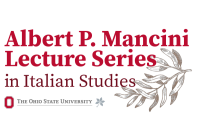
Beginning in Fall 2025, the Department of French and Italian (FRIT) at The Ohio State University is delighted to inaugurate a new Zoom-based lecture series titled New Directions in Italian Studies: Migration and Mobility. Curated and hosted by Assistant Professor of Italian, Dr. Qian Liu, this series will bring to campus—virtually—some of the most influential scholars, writers, and artists whose work is reshaping the landscape of Italian studies today.
At the heart of this initiative lies a commitment to exploring how themes of migration, diaspora, and cross-cultural exchange are redefining notions of Italian identity in the 20th and 21st century. The series responds to the broader transnational turn within the field—an intellectual shift that moves beyond the traditional nation-bound frameworks to examine Italy in a global context. For its inaugural season, the series proudly presents three compelling talks by distinguished guests: Giulia Riccò (University of Michigan), Gaoheng Zhang (University of British Columbia), and Ubah Cristina Ali Farah, the renowned Somali-Italian writer and activist.
Our first speaker will be Professor Giulia Riccò. Her book, The Italian Colony of São Paulo: Race, Class, and Cultural Capital in Brazil (Fordham University Press, 2025) argues that, contrary to what one might expect, Italians first became racialized as white in São Paulo, Brazil at the turn of the twentieth century. Whereas Italians in the United States struggled with xenophobia and were often not fully acknowledged as white, in São Paulo, due to a series of social, economic, and cultural factors, Italians became closely associated with ideas of whiteness, modernization, and civilization. This book brings to light how the overlooked experiences of Italians in Brazil complicate conventional narratives about the racial ambiguity and oppression of Italians in the Americas, on the one hand, and the conflation of Italians with cultural and economic backwardness in Europe, on the other. We will discuss this book and Professor Giulia Riccò's research more broadly and invite you to be part of the conversation.
Giulia Riccò is an Assistant Professor of Romance Languages and Literatures at the University of Michigan, Ann Arbor. Her research and teaching focus on modern Italian and Brazilian literature and culture, with particular attention to nationalism and migration. She is the author of The Italian Colony of São Paulo: Race, Class, and Cultural Capital in Brazil (Fordham University Press, 2025), part of the Critical Studies in Italian Migrations series and winner of the 2024 MLA Aldo and Jeanne Scaglione Award for a Manuscript in Italian Literary Studies. Her work has appeared in Cultural Dynamics, Forum Italicum, Radical History Review, Literature and (Im)migration in Brazil, Italian Culture, Altreitalie, and Public Books. She currently co-edits the H-Net platform TransItalian Studies and co-chairs the AAIS Critical Race, Migrations, and Diasporas Caucus.

In 2024, a generous gift from the family of Italian Professor Albert Mancini helped to create the Mancini Fund, which promotes and facilitates lecture series and experiences for Italian language, literature, and culture at Ohio State. It is thanks to funds like this that we can continue to provide Ohio State and the broader community with Italian programming.
To ask questions about accessibility or request accommodations, please contact Matt Lang.650@osu.edu. At least two weeks' advance notice will help us to provide seamless access.
